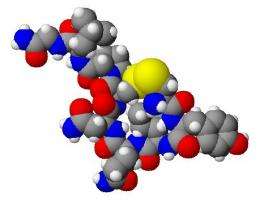June 10, 2014 report
Study shows oxytocin spray promotes social bonding behavior in dogs

(Phys.org) —A small team of researchers at Tokyo University has found that giving dogs oxytocin causes them to display stronger bonding behavior, both with people and other dogs. In their paper published in Proceedings of the National Academy of Sciences, the team describes their experiments with several dogs and what their findings might suggest about the impact of oxytocin on mammals in general.
A lot of studies have been conducted on oxytocin, a hormone that is naturally produced by most mammals. Because of its impact on behavior, the hormone has been given the unofficial name of Love Hormone—increased levels of it in humans has been found to occur naturally during sexual arousal and it's also been found to cause people to be more social and less antagonistic. In this latest study, the team in Japan sought to find out if the same is true for dogs.
To find out how a sudden increase of oxytocin might affect how a dog behaves, the researchers enlisted the assistance of 16 pet adult dogs and their owners. Each dog had a mist sprayed into its nostrils—for some the mist contained oxytocin, for others it was just salt water. Next, blood and urine samples were taken from the dogs every five minutes, in-between which, they were monitored to see how they interacted with first with their owners, then with other dogs.
The researchers report that as expected, oxytocin levels in the dogs rose more than just the amount that was in the mist—their bodies produced more when detecting heightened levels. More importantly, they also report detecting noticeable changes in behavior of the dogs that received the oxytocin—with their owners, they pawed and sniffed more than the dogs in the control group, and attempted to hold eye contact more as well. In short, they demonstrated more pronounced bonding behavior. The researchers also report finding much the same thing when the dogs were allowed to interact with other dogs. They noted stronger bonding behavior regardless of whether the other dogs were the same breed or not.

The researchers suggest their study proves that oxytocin levels in dogs (and likely other mammals) are not related to just reproduction, but instead they appear to be a part of a process involved in bonding and promoting unity among group members.
More information: Oxytocin promotes social bonding in dogs, Teresa Romero, PNAS, DOI: 10.1073/pnas.1322868111
Abstract
Recent evidence suggests that enduring social bonds have fitness benefits. However, very little is known about the neural circuitry and neurochemistry underlying the formation and maintenance of stable social bonds outside reproductive contexts. Oxytocin (OT), a neuropeptide synthetized by the hypothalamus in mammals, regulates many complex forms of social behavior and cognition in both human and nonhuman animals. Animal research, however, has concentrated on monogamous mammals, and it remains unknown whether OT also modulates social bonds in nonreproductive contexts. In this study we provide behavioral evidence that exogenous OT promotes positive social behaviors in the domestic dog toward not only conspecifics but also human partners. Specifically, when sprayed with OT, dogs showed higher social orientation and affiliation toward their owners and higher affiliation and approach behaviors toward dog partners than when sprayed with placebo. Additionally, the exchange of socio-positive behaviors with dog partners triggered the release of endogenous OT, highlighting the involvement of OT in the development of social relationships in the domestic dog. These data provide new insight into the mechanisms that facilitate the maintenance of close social bonds beyond immediate reproductive interest or genetic ties and complement a growing body of evidence that identifies OT as one of the neurochemical foundations of sociality in mammalian species.
Journal information: Proceedings of the National Academy of Sciences
© 2014 Phys.org




















